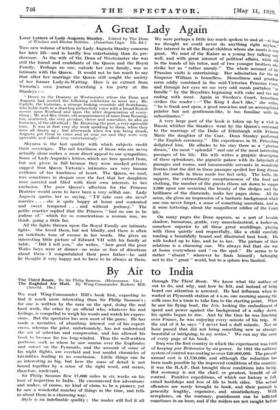A Great Lady Again THIS new volume of letters by
Lady Augusta Stanley concerns her later life—and is hardly less entertaining than its pre- decessor. As the wife of the Dean of Westminster she was still the friend and confidante of the Queen and the Royal Family. Perhaps no one, outside her own family, was so intimate with the Queen. It would not be too much to say that after her marriage the Queen still sought the society of her former Lady-in-Waiting. Here is an extract from Victoria's own journal describing a tea party at the Stanleys " Drove to the Deanery at Westminster where the Dean and Augusta had invited the following celebrities to meet me ; Mr. Carlyle, the historian, a strange looking eccentric old Scotchman, whowholds forth in a drawling melancholy voice with a broad Scotch accent upon Scotland and upon the utter degeneration of every- thing ; Mr. and Mrs. Grote, old acquaintances of mine from Kensing- ton, unaltered, she very peculiar, clever and masculine, he also an historian, of the old school ; Mr. Browning the poet, a very agreeable man. It was at first very shy work speaking to them, when they were all drawn up ; but afterwards when tea was being drunk, Augusta got them to come and sit near me and they were very agreeable and talked very entertainingly."
Shyness is the last quality with which subjects credit their sovereigns. The sad loneliness of those who are never actually alone makes a more direct appeal to our sympathies. Some of Lady Augusta's letters, which are here quoted from, but not given in full because they were marked private, suggest that Queen Victoria's intimates saw very human evidence of her loneliness of heart. The Queen, we read, was sometimes in despair over the fact that her daughters were married and filled with their own interests to her exclusion. The poor Queen's affection for the Princess Beatrice would seem to have been a very selfish one. Lady Augusta quotes her as saying, " I'll take care she never marries . . . she is quite happy at home and contented and sweet tempered . . . and without jealousy." The polite courtier replied that the Princess " had no one to be jealous of," which for so conscientious a woman was, we think, going a little far.
All the lights thrown upon the Royal Family are intimate lights. She loved them, but not blindly, and there is often an indefinite tone of excuse in her words. She gives an interesting little picture of Edward VII with his family at table. " Did I tell you," she writes, " how good the poor Wales boys were at dinner—no noise or fuss of directions about them—I congratulated their poor father—he said he thought it very happy not to have to be always at them.
We were perhaps a little too much spoken to and at—at least we thought we could never do anything right anyhow" Her interest in all the Royal children whom she meets is very great. We read of the Kaiser as a young boy talking Very well, and with great interest of political affairs, while slip in the hands of his tutor, and of two younger brothers who strike her as " rather unruly." The whole account of her Prussian visits is entertaining. Her admiration for the old Emperor William is boundless. Homeliness and grandeur seem oddly combined in the mid-Victorian Prussian Court, and through her eyes we see very odd meals partaken ea famille " by the Royalties beginning with cake and tea and ending with meat. Again in Sweden's Court, homeliness strikes the reader :—" The King I don't like," she writes, " he is frank and open, a good musician and an accomplished painter but not gentleman-like, is too familiar with his
subordinates." •
A very large part of the book is taken up by a visit to Russia whither the Stanleys went by the Queen's command to the marriage of the Duke of Edinburgh with Princess Marie the daughter of the Czar. Dean Stanley performed " the English ceremony." His experiences in St. Petersburg delighted him. He alludes to his stay there as a "glorious dream," the most " splendid " and one of the most interesting passages of his life. His wife writes a graphic description of these splendours, the gigantic palace with its labyrinth of passages and rooms, and innumerable servants in wonderful liveries (but the dirt in these passages spoiled her long dresses and the smells in them made her feel sick). The balls, the suppers, the extraordinary sumptuousness of the food and clothing, the number of the guests (there sat down to supper 2,000 upon one occasion) the beauty of the sledges and the brilliance of the diamonds, make her pages shine. All the same, she gives an impression of a barbaric background which one can never forget, a sense of something uncertain, and as it were tottering, about the magnificent edifice of the Court life.
On many pages the Dean appears, as a sort of lovable shadow, humorous, gentle, very unecclesiastical, a looker-on, somehow superior to all these great worldlings, playing with them quietly and respectfully, like a child carefully reading a beautifully bound and illustrated best book. His wife looked up to him, and he to her. The picture of their relations is a charming one. We always feel that she was at home everywhere and " on the spot." He seems to be rather " absent " wherever he finds himself ; belonging not to the " great " world, but to a sphere less limited.










































 Previous page
Previous page